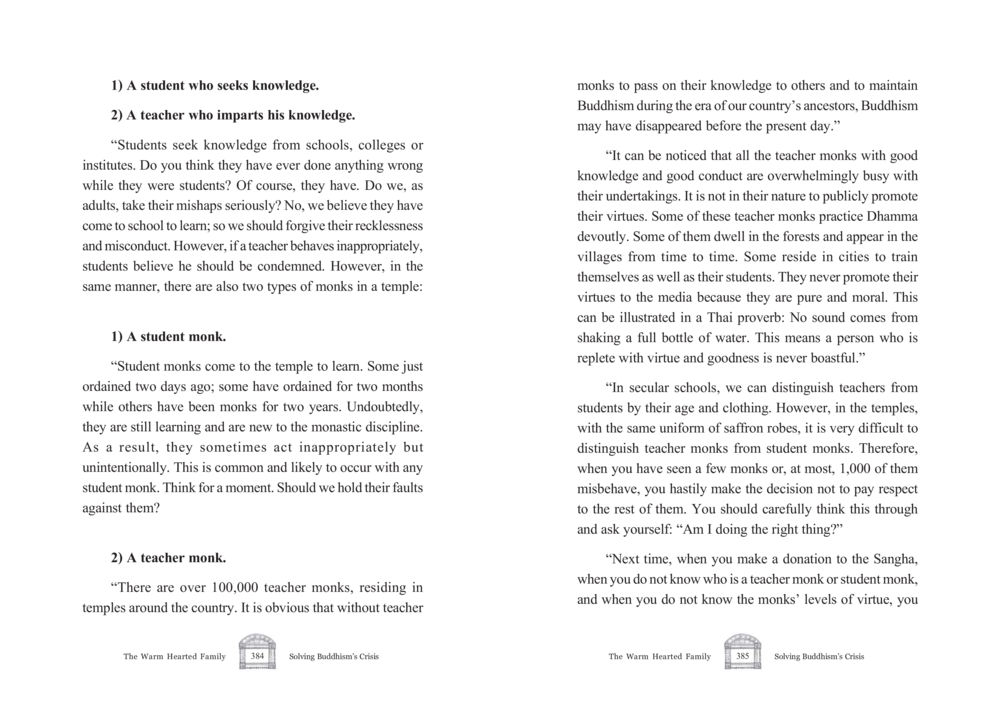Understanding the Roles of Students and Teachers in Buddhism : หน้า 193/207
The Warm Hearted Family : หน้า 193/207 Explores the dynamics between student monks and teacher monks in Buddhist practice, focusing on learning, conduct, and the essence of teaching in temples.
1 ครั้ง

สรุปเนื้อหา
บทความนี้พูดถึงบทบาทของนักเรียนกับอาจารย์ในศาสนาพุทธ โดยแสดงให้เห็นถึงการเรียนรู้ของนักเรียนสงฆ์ที่มาถึงวัดเพื่อศึกษา ธรรมะและวินัยในขณะที่การกระทำผิดเป็นเรื่องธรรมดา นอกจากนี้ยังชี้ให้เห็นว่าผู้สอนสงฆ์นั้นมีอาจารย์สงฆ์มากมายที่รักษาศาสนาพุทธและถ่ายทอดความรู้ โดยไม่ต้องการการโปรโมตและเกียรติยศ การแยกรูปแบบของนักเรียนและอาจารย์ในวัดนั้นเป็นเรื่องที่ท้าทายในกรณีที่แต่ละคนมีเครื่องแต่งกายเดียวกัน โดยเน้นให้ผู้มีจิตใจดีพิจารณาและให้ความเคารพแก่วัดและภิกษุสงฆ์โดยไม่ตัดสินจากความประพฤติของบางคน เท่านี้ก็เพียงพอในการรักษาความบริสุทธิ์ของศาสนาและการเรียนรู้.
หัวข้อประเด็น
-บทบาทนักเรียนและอาจารย์
-การเรียนรู้ในศาสนาพุทธ
-การกระทำและความประพฤติของสงฆ์
-การมีส่วนร่วมของสงฆ์ในสังคม
-แนวคิดเกี่ยวกับการสอนและการแสดงออกของความดี
ข้อความต้นฉบับในหน้า
1) A student who seeks knowledge.
2) A teacher who imparts his knowledge.
"Students seek knowledge from schools, colleges or
institutes. Do you think they have ever done anything wrong
while they were students? Of course, they have. Do we, as
adults, take their mishaps seriously? No, we believe they have
come to school to learn; so we should forgive their recklessness
and misconduct. However, if a teacher behaves inappropriately,
students believe he should be condemned. However, in the
same manner, there are also two types of monks in a temple:
1) A student monk.
"Student monks come to the temple to learn. Some just
ordained two days ago; some have ordained for two months
while others have been monks for two years. Undoubtedly,
they are still learning and are new to the monastic discipline.
As a result, they sometimes act inappropriately but
unintentionally. This is common and likely to occur with any
student monk. Think for a moment. Should we hold their faults
against them?
2) A teacher monk.
"There are over 100,000 teacher monks, residing in
temples around the country. It is obvious that without teacher
monks to pass on their knowledge to others and to maintain
Buddhism during the era of our country's ancestors, Buddhism
may have disappeared before the present day."
"It can be noticed that all the teacher monks with good
knowledge and good conduct are overwhelmingly busy with
their undertakings. It is not in their nature to publicly promote
their virtues. Some of these teacher monks practice Dhamma
devoutly. Some of them dwell in the forests and appear in the
villages from time to time. Some reside in cities to train
themselves as well as their students. They never promote their
virtues to the media because they are pure and moral. This
can be illustrated in a Thai proverb: No sound comes from
shaking a full bottle of water. This means a person who is
replete with virtue and goodness is never boastful."
"In secular schools, we can distinguish teachers from
students by their age and clothing. However, in the temples,
with the same uniform of saffron robes, it is very difficult to
distinguish teacher monks from student monks. Therefore,
when you have seen a few monks or, at most, 1,000 of them
misbehave, you hastily make the decision not to pay respect
to the rest of them. You should carefully think this through
and ask yourself: "Am I doing the right thing?"
"Next time, when you make a donation to the Sangha,
when you do not know who is a teacher monk or student monk,
and when you do not know the monks' levels of virtue, you
The Warm Hearted Family 384
Solving Buddhism's Crisis
The Warm Hearted Family
385
Solving Buddhism's Crisis
หน้าหนังสือทั้งหมด

1

2

3

4

5

6

7

8

9

10

11

12

13

14

15

16

17

18

19

20

21

22

23

24

25

26

27

28

29

30

31

32

33

34

35

36

37

38

39

40

41

42

43

44

45

46

47

48

49

50

51

52

53

54

55

56

57

58

59

60

61

62

63

64

65

66

67

68

69

70

71

72

73

74

75

76

77

78

79

80

81

82

83

84

85

86

87

88

89

90

91

92

93

94

95

96

97

98

99

100

101

102

103

104

105

106

107

108

109

110

111

112

113

114

115

116

117

118

119

120

121

122

123

124

125

126

127

128

129

130

131

132

133

134

135

136

137

138

139

140

141

142

143

144

145

146

147

148

149

150

151

152

153

154

155

156

157

158

159

160

161

162

163

164

165

166

167

168

169

170

171

172

173

174

175

176

177

178

179

180

181

182

183

184

185

186

187

188

189

190

191

192

193

194

195

196

197

198

199

200

201

202

203

204

205

206

207
หนังสือที่เกี่ยวข้อง
Load More
